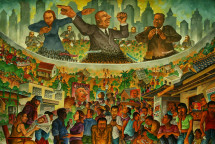Organizing the slaves of the 21st century: Mexico’s first independent and democratic farmworker union fighting rural authoritarianism in the context of global capitalism
Topics
Regions
What led the jornaleros of San Quintin who rose up in 2015 to declare they were tired of being the “slaves of the 21st Century”?

Authors
On March 17, 2015, tens of thousands of jornaleros (rural salaried farmworkers) began a three-month long general strike that brought agricultural production to a grinding halt in the valley of San Quintin, Baja California, Mexico. The striking workers, mostly indigenous migrants from southern Mexico, called themselves the “slaves of the twentyfirst century” for being displaced from their communities of origin to work ten- to twelve-hour shifts seven days a week for an average daily wage of 120 pesos (roughly US$7) without the benefits and protections afforded by law. A key component of their demands included the derogation of the secretive collective bargaining agreements with pro-business, government-imposed labor unions and the creation of a democratic alternative. On January 12, 2016, the National Independent Democratic Union of Agricultural Workers (SINDJA) officially received recognition as Mexico’s first independent, grassroots farmworker union.
In Mexico there are more than six million jornaleros who live in conditions of extreme poverty and who are denied basic labor and human rights. Through a year of ethnographic fieldwork in the valley of San Quintin my research documents how transnational corporations conspire with corrupt local governments and authoritarian unions in what Saskia Sassen labels “predatory formations.” In Mexico, predatory formations include complex dynamics of the old authoritarian-corporatist state in a context of neoliberal globalization. The contradictory relationship between remnants of the authoritarian popu list post-revolutionary government and global agribusiness represents a weakening of Mexico’s fragile democratic institutions as well as the wages and protections of proletarianized ex-campesinos in conditions of extreme precarity. Agricultural workers must be included in visions for an emancipatory rural politics and it is displaced, indigenous workers like those of San Quintin that offer practical alternatives to mobilize against entrenched forms of authoritarianism in the context of global capitalism.
Jornaleros throughout Mexico, not just in San Quintin, suffer significant abuses to their human and labor rights at the hands of transnational predatory formations rooted in particular localities with unique political histories. What the jornaleros have in common as a class of salaried agricultural workers is a basic denial of their rights to freedom of association, to collectively bargain and to have a voice in their workplace. Although local actors like small, medium and large farms are the first order of labor suppression and exploitation within the framework of Mexican labor law and national union federations, US based multinational corporations could not effectively extract enormous profit from these ventures without their complic ity in these predatory formations. Distributors like Driscoll’s, the world’s leading distributer of berries, employ the corporatist “charro” unions that exist on the farms of their subsidiaries like Berrymex whose role is to keep wages low, suppress worker organizing and protect the interests of the company. Currently, the SINDJA union has declared an international boycott against Driscoll’s until the corporatist union is derogated and workers are free to decide on a collective bargaining agreement with the union of their choice.
When the jornaleros of San Quintin rose up in 2015 to declare they were tired of being the “slaves of the 21st Century” their use of the word slavery effectively equates the negation of their human dignity at the hands of these transnational predatory formations. As Carlos de Castro argues, a legal framework regulating labor relations that allow workers to have a some control over the conditions of their labor is not simply about matters related to production but also as a member of a greater political community, not simply as a worker who sells his or her labor power on the market, but as an individual granted legal and social rights linked to citizenship and participation. “The systematic negation of their union rights,” remarked Hubert C. de Grammont, “consists in a legal exclusion of such magnitude that, more than creating a second-class citizenry, as is often affirmed, negates the universal concept of the citizen with the same rights and same duties under the law.”
Thus an emancipatory rural politics must be rooted in resistance to the gendered and racialized exploitation of rural agricultural workers and that provides concrete material benefits achieved through class-based organization. Although not a “new” concept, labor unions are necessary in the rural environment given the spread of global agricultural enclaves throughout the rural world. What is “new” about the case of San Quintin is the importance of locally entrenched racial/ethnic and gendered dynamics of new modes of industrial organization in a highly seasonal and migratory population that fall outside of classical urban, industrial unionism and its concomitant politics. As union density falls in urban areas and unions are put on the defensive, salaried agricultural workers are providing new visions of organizing for an emancipatory rural politics.
This paper was presented at the Emancipatory Rural Politics Initiative (ERPI) 2018 Conference: "Authoritarian Populism and the Rural World"